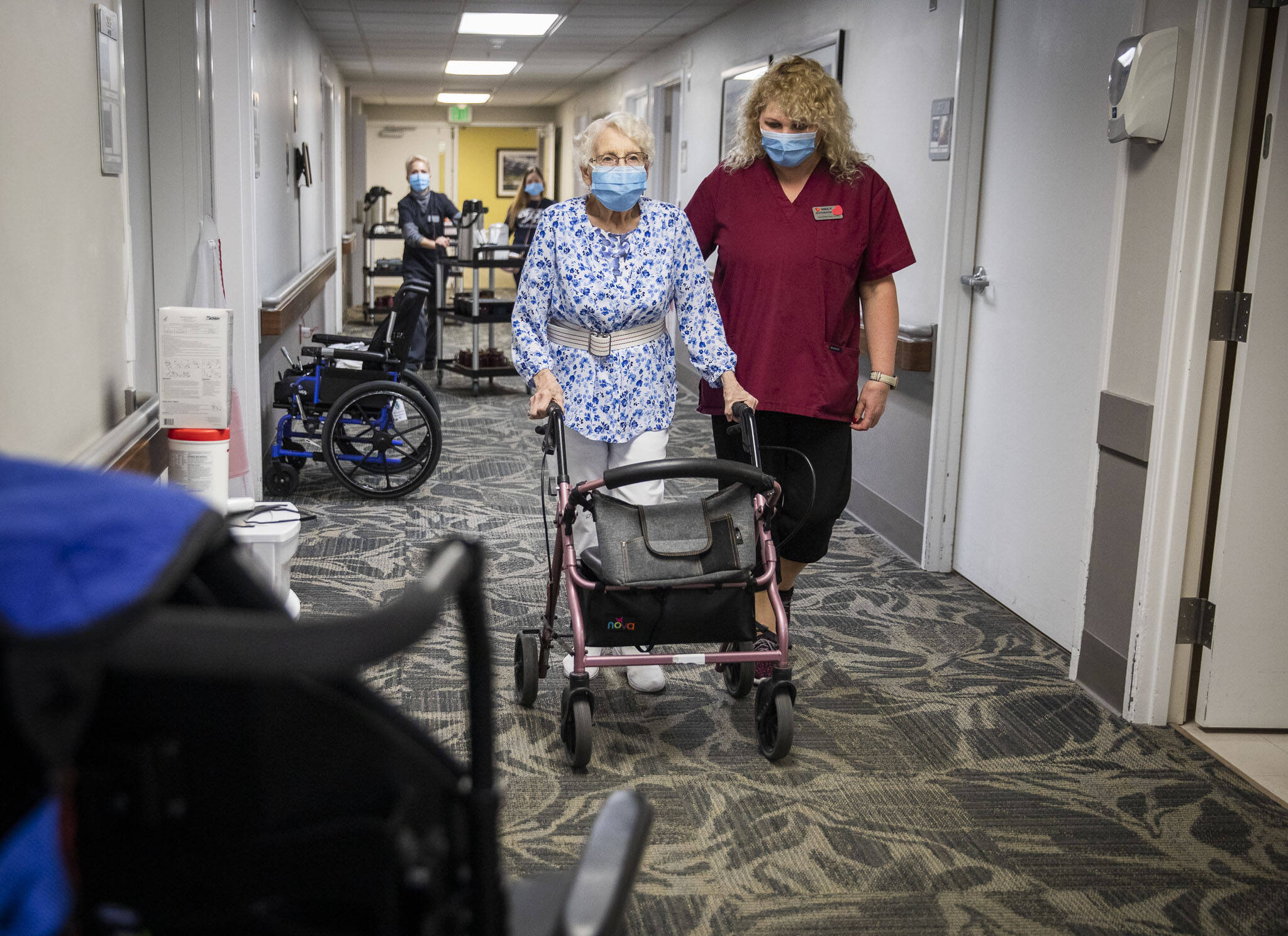OLYMPIA — Hospital executives and nurse union leaders achieved detente late last month in their years-long battle on staffing levels.
They only had a handshake, not a deal.
Agreement required several more days of negotiations between the two groups and a handful of state senators, drafting every word in a bill prescribing procedures for drafting, deploying and enforcing of staffing plans.
On Monday, the product of those labors, Senate Bill 5236, cleared the Senate on a 35-13 vote. It now heads to the House.
“I think there is a clear incentive for every hospital in the state to step up for their workers,” Sen. Mark Mullet, D-Issaquah, told colleagues before the vote.
Sen. June Robinson, D-Everett, the bill’s prime sponsor, teamed with Mullet to get it passed.
“Our health care workforce has been asking us to address this situation for a long time, and it has gotten worse throughout the pandemic as health care in general has become more stressful, with more people coming in need of care,” she said ahead of passage.
“When our hospitals do not play by these rules and provide the protections this bill lays out, they will face corrective actions — they will face consequences,” she said. “ It’s a really good bill that will provide a balance and strong workplace protections for our health care workers.”
Opposition from Republicans has centered on concerns hospitals would be forced into either hiring staff they couldn’t afford or reducing services to avoid hiring. Smaller hospitals and those in rural areas could be hurt the most with strict standards, they argued.
As now written, the bill exempts hospitals with fewer than 25 acute care licensed beds and certified as critical access hospitals.
“I still have concerns. It felt like we were going after the hospitals,” Sen. Curtis King, R-Yakima, said before voting for the bill. “I hope, I pray that we don’t have to go through this again. I feel like this bill will really help nurses and maybe the next time we can come back with a bill to help the hospitals.”
Front-line nurses and health care workers, many physically and emotionally wiped out by the pandemic, view ratios as crucial to improve job safety by addressing staffing shortages they said create dangerous conditions for themselves and patients.
Hospital executives contend that to comply with ratios would require hiring thousands of nurses, an improbability in the midst of an industry-wide staffing crisis. Hospitals would wind up leaving beds unfilled, they said.
Under SB 5236, a committee of administrators and nurses of a hospital will agree on how many nursing staff will be assigned in each patient care unit, and how workers will be assured of getting proper rest and meal breaks.
Those plans are due to the state by January 2025 and deployed six months later. Over time, hospitals must file regular reports to the state Department of Health, as well as Labor & Industries. Those found to be out of compliance too much of the time could be fined thousands of dollars, according to the bill.
The Washington State Hospital Association was glad to get a deal done.
“We all want to support hospital staff and also ensure access to health care for our communities,” said Chelene Whiteaker, the association’s senior vice president of government affairs in a statement. “We are pleased to be able to reach an agreement that recognizes the importance of the voice of staff at the local level, who are best positioned to develop staffing plans that appropriately match the needs of patients with the experience of staff.”
The bill does not mandate minimum staffing levels, often called ratios, which nurses have long sought. It will give nurses a stronger voice in establishing working conditions.
“This bill isn’t quite everything we’ve been calling for,” acknowledged Jack Sorenson, spokesman for a coalition of health care worker unions backing the bill. “This compromise we got passed in the Senate is a real and meaningful step forward for safe staffing.”
Kelli Johnson, a nurse at Providence Regional Medical Center Everett, said it’s progress even if it’s not as much as hoped.
A key piece is it will require hospitals do a lot more reporting to the state on when they are not sufficiently staffed, she said.
”Nurses and health care workers have been carrying the burden for a long time. We needed something passed. This bill is that something a step in the right direction,” she said.
Katy Roth, a veteran nurse who also works at Providence in Everett, expressed apprehension Tuesday. She has kept watch on the bill but had not yet read the fine print of the version passed by the Senate.
“If this current bill doesn’t have ratio language in it, I am concerned how successful it will be,” she said. “It needs to have ratio language in it to protect patients’ safety.”
The bill now heads to the House.
Last session, majority Democrats approved legislation containing specific ratios of patients per nurse. Mullet blocked it in the Senate Ways and Means Committee, then committed working on a potential this year.
“This is a very different approach. This one targets bad actors,” Mullet said in an interview. Hospitals will face “regulatory misery” if they fail to abide by the terms of the staffing plans, he said.
Rep. Marcus Riccelli, D-Spokane, carried the 2022 version. While what’s coming from the Senate lacks ratios, he sounded confident it will advance without a major massaging by his colleagues because it is still focused on ensuring adequate work force in hospitals.
“We see that these staffing plans have existed for years without much teeth in them,” he said. With the bill, he said, “we’ll be making sure these plans are enforceable and have teeth in them.”
Jerry Cornfield: 360-352-8623; jcornfield@heraldnet.com; Twitter: @dospueblos.
Talk to us
> Give us your news tips.
> Send us a letter to the editor.
> More Herald contact information.

























